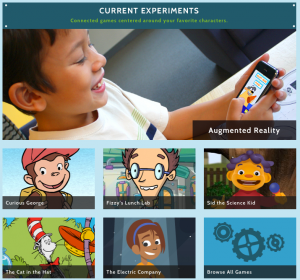“Every child absorbs information a different way, so these games target different learning styles,” said Sara Dewitt, vice president of PBS KIDS Interactive. “We want to give kids multiple entryways into interactions with their favorite characters in a way that’s consistent. Take what children are excited about, like Curious George and add on a layer of education.”
She added that understanding a concept is strengthened when a child interacts with two or more media, whether it’s playing an online game, watching a video clip, playing a mobile game, or seeing it on an interactive whiteboard.
For learning concepts at younger ages, the introduction of the touch screen has been tremendous, Dewitt said. “It’s a revolution,” she says. “Kids motor skills aren’t refined enough to play with a clunky remote and mouse, so with this, they have immediate power to jump right in. The technology is transparent."
PBS is also interested in experimenting with augmented reality games. “We want to know if we take this very new, cutting edge piece of technology and apply it to games, does manipulating three-dimensional objects and using real space, will that help?”
PBS is not just working on games. According to PBS's David Lowenstein, the next phase of this initiative next year will be to create a progress tracker that will allow parents to see what skills in which games their kids have mastered. "The hope is that the back-end system can also be prescriptive," he said. "If it’s clear to us that a kid is struggling, then we can suggest a next game or other kinds of skills."
"This is a game changer for the field," he said. "Kids are playing with all this stuff everywhere but at school, so if we can use these tools in innovative ways, every new technology is an opportunity for learning."
They're also aiming to create "open-ended play" that's more creating than consuming. "What kinds of things can we give kids to create a story or a version of a game that could be a skill we build on when they get older, and more cognitively advanced, in order to do some media creation on their own," he said.
But PBS is not abandoning its legendary television programming. “Just staying on top of kids media diet right now is difficult. We recognize that we can’t abandon TV, that’s still a really critical way of delivering educational content,” she said. “We know kids are still watching a lot of videos, but also picking up on the new technology so quickly, so we want to see what we can do with all of them.”
The PBS Kids site gets 12 million unique visitors per months, Dewitt said, and the mobile page traffic is getting “huge numbers,” too.


